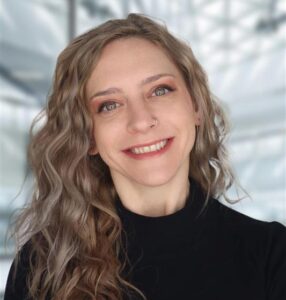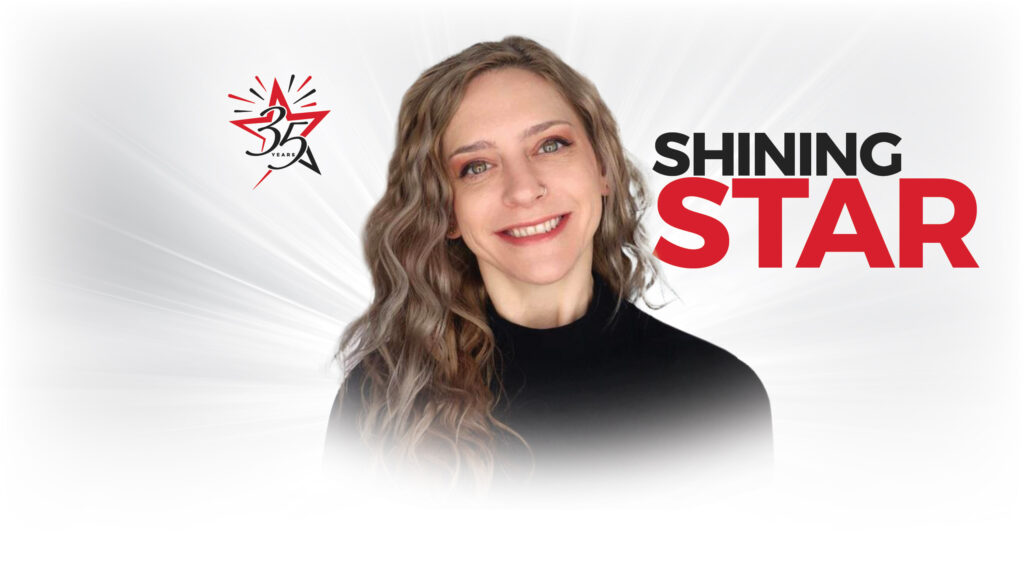In honor of 35 years of inspiring administrative excellence, this feature highlights shining stars of the administrative profession: trailblazers who are excelling in their roles and their advice for other administrative professionals.
Q: Can you share the story of how you began your career as an executive assistant and what inspired you to pursue this path?
I landed my first admin role in 2003 as a student worker, assisting the admin staff and the dean of the art department while I was in college.
When I graduated, I was engaged to someone in the military, and I saw this career as something that could offer flexibility and continuity as we moved from city to city.
It wasn’t until 2008, when I was living in Boston, that everything really clicked for me. I had the opportunity to step into the role of executive assistant to the CEO of the company I was working for, and that’s when I started realizing this wasn’t just a convenient job, it was something I was truly talented at.
That role gave me the confidence to see this as a career, not just a job, and set me on the path I’m on today.
Q: What would you consider your biggest achievement as an executive assistant, and why does it stand out?
I consider my biggest achievement as an executive assistant to be all the little wins that add up. Whether it’s organizing a major gala or a big team meeting, locking in that crucial meeting for my boss, or handling those panicked flight changes so they can make it to their kid’s hockey game, it’s these moments that stand out.
Being there as a sounding board or getting that “You crushed it” thank-you text as I drive home from an event is pretty rewarding.
All these small wins have gotten me to where I am in my career—a career that I love.
Honestly, being passionate about what I do and loving it is the biggest achievement.
Q: What are the top three skills every successful executive assistant should master, and why?
- Mastering the calendar like a strategist – Calendaring isn’t just about finding open time slots; it’s about building a workflow that maximizes your leader’s productivity. Knowing when they need focus time, when to stack meetings for efficiency, and when to create breathing room can make all the difference.
- Listening and asking the right questions – It’s not just about hearing what’s said; it’s about understanding what isn’t said. A great EA listens to their leader, team, and stakeholders. Asking questions helps you stay ahead of priorities and uncover potential issues.
- Observation – Paying attention to body language, social cues, and office dynamics gives you a leg up. Noticing small shifts in focus or tone helps you anticipate needs before they’re even spoken.
Q: Are there any tools, apps, or technologies that you rely on daily to stay efficient and organized?
Since most of my career has been in Microsoft-based organizations, I live by color coding—for calendars, inboxes, and task priorities.
I’ve tried different virtual organization tools, but my brain retains information better when I write it down. So I’ve built my own system in a daily notebook that keeps me on task.
I’ve found that the best approach is a balance between digital and analog—mixing both creates the perfect recipe for staying organized.
When it comes to efficiency, I fully embrace IT. Copilot for meeting minutes has been a game-changer; instead of obsessing over capturing every detail, I let it transcribe while I engage in the meeting.
I also use ChatGPT to help refine emails—especially at the end of the day when my brain battery is low or when I need an extra set of eyes before sending.
Q: How do you keep your skills sharp and stay updated with new tools or trends in your field?
I’m all about continuous learning—it’s just part of my daily routine.
I subscribe to EA newsletters from Office Dynamics and other organizations.
I also make a point to read what my leader is reading. When I check his inbox, I love seeing what he’s reading—it helps me understand his priorities and keeps me in the loop.
I stay on top of industry trends, including Higher Ed and IT, since I support the Chief Information Officer at Vanderbilt University.
Staying in the habit of learning keeps me sharp and ready for whatever’s next. I’ve pursued certifications and attend webinars.
Q: What has been the most challenging situation you’ve faced in your career, and how did you navigate through it?
I spent nearly 12 years with one company, and while I excelled at my job, there was no room to grow. I could have stayed comfortable, but I wanted to evolve into a true strategic partner.
After months of reflection and conversations with colleagues, I realized that I had to make it happen. That meant leaving my job and my city. I moved across the country, stepped into a new industry, and started fresh. It was terrifying, but also the most rewarding decision I’ve made.
Sometimes, the hardest thing isn’t knowing you need more—it’s having the courage to go after it.
Q: How do you maintain resilience and focus during high-pressure situations or when unexpected issues arise?
My background in acting taught me improv and thinking on my feet. Life as a military spouse taught me how to pivot quickly and adapt to constant change. Playing roller derby reinforced teamwork, quick decision-making, and staying calm under pressure. And pushing my limits with running and weightlifting built the endurance to stay focused.
In executive roles, fires happen—it’s part of the job. You learn when to roll up your sleeves and get to work. I embrace change and love the moment after helping put out a fire, knowing I made an impact.
Q: What strategies have you used to build a strong, trusting partnership with your executive(s)?
It starts with open communication and setting clear expectations from day one. I was upfront in the interview about needing access to his inbox and team meetings. That groundwork let us build trust immediately.
Trust takes time and consistency. The first rule is confidentiality. Beyond that, asking questions and creating dialogue helps me understand my leader’s struggles and what success looks like, so I can anticipate needs.
Honesty is huge. Owning my mistakes shows integrity and deepens trust. Being real, reliable, and proactive makes the partnership strong.
Q: What are your best practices for managing communication between your executive and their stakeholders, both internal and external?
I always stay on top of my leader’s priorities. If something urgent arises, I pivot to get the right people in front of him while tracking his deliverables.
I also understand his team’s priorities by monitoring their agendas and supporting them so nothing slips through the cracks.
When scheduling conflicts occur, I provide context as needed. A little transparency helps stakeholders stay understanding and cooperative.
For external contacts, I balance professionalism with rapport-building. Smooth communication is about being proactive, setting expectations, and ensuring everyone feels heard.
Q: How do you prioritize your tasks when everything seems urgent and important?
I rely on a morning routine. First, I review my inbox, my leader’s inbox, and both calendars to gauge the day’s pulse. A checklist keeps me on track.
I clarify what’s truly urgent by asking about deadlines: “I’m working on this for [Leader X]. Can I get it to you by [time]?” That helps me prioritize what matters instead of reacting to every request.
I balance structure and flexibility to handle competing demands effectively.
Q: How do you balance the demands of your role while maintaining your own well-being and avoiding burnout?
For physical health, I focus on staying active—I run and have a solid workout routine.
For mental health, I make time for creative outlets like video games, reading, and writing, and I prioritize therapy and meditation.
I remind myself to step away and enjoy life. Planning trips, hiking, or relaxing with loved ones keeps me balanced. Setting boundaries is crucial—I want to sustain this career long-term.
Q: How do you approach conflict resolution, either with your executive or with colleagues, in a way that preserves relationships and achieves results?
For conflict resolution, I start by checking my ego. I ask if the conflict is worth it. I also consider how my responses reflect on my leader, balancing professionalism and empathy.
I get perspective from a trusted colleague—an outside view helps clarify the situation. And I never respond to frustrating emails in an emotional state; giving myself time makes a difference.
With my executive, our strong relationship lets us talk things through, even when it’s tough.
Q: What resources—books, courses, or mentors—have had the greatest impact on your career development?
Attending my first Office Dynamics conference was eye-opening. I saw how impactful our profession is.
Author Peggy Vasquez’s ‘Not Just an Admin‘ inspired me. Pursuing certifications, like the strategic partnership certification from Office Dynamics, defined who I wanted to be.
My leaders have also influenced me; watching them lead drove me to keep growing. These moments and resources stand out.
Q: What do you love most about being an executive assistant, and why does it resonate with you?
What I love most is the chance to be a strategic partner and help my leader focus on what matters while making their job easier. Seeing them thrive, knowing I made things run smoothly, is incredibly rewarding.
No two days are the same; the mix of strategy, problem-solving, and support keeps me engaged. It’s about being part of something bigger and making a difference.
Q: What do you think will be the most important skill or mindset for future administrative professionals to cultivate?
I believe the most important mindset is to know your worth. Our roles are about having a seat at the table and making an impact. Understanding that our job is more than a stepping stone—being an EA can be a fulfilling, rewarding career—lets us support and grow our leaders.
Be confident, know your value, and be a true partner.

Deanna Danger, CWCA, CESP
Executive Assistant to the CIO of VUIT
Vanderbilt University
Deanna Danger isn’t your average Executive Assistant—she’s a strategic partner,
problem-solver, and force for change in the EA profession. With over 20 years of
experience supporting C-suite leaders in higher education, healthcare, and manufacturing, she’s built a reputation for driving efficiency, fostering strong partnerships, and making things happen.
Currently, Deanna supports the Chief Information Officer at Vanderbilt University, where she does more than manage calendars and logistics—she optimizes workflows, leads
key initiatives, and ensures leadership can operate at their highest level. Previously, she played a pivotal role supporting senior executives at Direct Supply in Milwaukee.
Beyond the office, Deanna is passionate about elevating the EA profession. She co-leads Vanderbilt’s Administrative Group, supporting 100+ administrative professionals through training, networking, and career development initiatives. She honed her leadership, operations, and coaching skills as a roller derby coach and league board member, builds community, connection, and movement by co-running an LGBTQ+ running.
Deanna is a Certified Executive Strategic Partner and World Class Assistant, plus holds Microsoft certifications in Outlook and Word. She’s on a mission to shift perceptions of the EA profession—proving it’s not just a job, but a career that demands skill, strategy, and impact.

